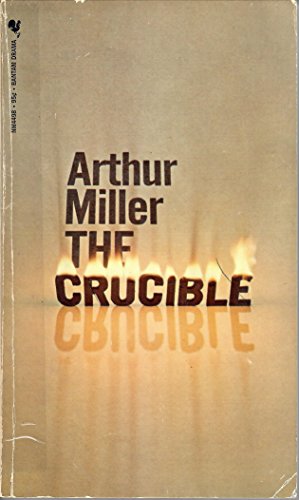-
The Crucible: A Play in Four Acts
Arthur Miller, Christopher W. E. Bigsby
Paperback (Penguin Classics, March 25, 2003)Based on historical people and real events, Arthur Miller's play uses the destructive power of socially sanctioned violence unleashed by the rumors of witchcraft as a powerful parable about McCarthyism.
-
The Crucible: A Play in Four Acts
Arthur Miller
eBook (Penguin, Oct. 6, 2011)Arthur Miller's classic parable of mass hysteria draws a chilling parallel between the Salem witch-hunt of 1692 - 'one of the strangest and most awful chapters in human history' - and the McCarthyism which gripped America in the 1950s. The story of how the small community of Salem is stirred into madness by superstition, paranoia and malice, culminating in a violent climax, is a savage attack on the evils of mindless persecution and the terrifying power of false accusations.
-
The Fugitive; a Play in Four Acts
John Galsworthy
Hardcover (Palala Press, Nov. 18, 2015)This work has been selected by scholars as being culturally important, and is part of the knowledge base of civilization as we know it. This work was reproduced from the original artifact, and remains as true to the original work as possible. Therefore, you will see the original copyright references, library stamps (as most of these works have been housed in our most important libraries around the world), and other notations in the work.This work is in the public domain in the United States of America, and possibly other nations. Within the United States, you may freely copy and distribute this work, as no entity (individual or corporate) has a copyright on the body of the work.As a reproduction of a historical artifact, this work may contain missing or blurred pages, poor pictures, errant marks, etc. Scholars believe, and we concur, that this work is important enough to be preserved, reproduced, and made generally available to the public. We appreciate your support of the preservation process, and thank you for being an important part of keeping this knowledge alive and relevant.
-
The Crucible: A Play in Four Acts
Arthur Miller, Christopher Bigsby
Mass Market Paperback (Penguin Classics, Oct. 1, 1995)Based on historical people and real events, Miller's classic play about the witch hunts and trials in 17th century Salem, Massachusetts, is a searing portrait of a community engulfed by hysteria. Written in 1953, The Crucible is a mirror which Miller uses to reflect the anti-Communist hysteria inspired by Senator Joseph McCarthy's "witch-hunts" in the U.S. Reissue.
-
The Crucible: A Play in Four Acts
Arthur Miller
Paperback (Bantam Books, Aug. 16, 1959)Few serious American playwrights have captured the imagination of the theatre public all over the world as has Arthur Miller with Death Of A Salesman and The Crucible. Mr. Miller's plays are rooted in a realistically critical view of American life and propelled by the intense personal conviction of a man who cares what he writes about and writes about something that matters. In The Crucible he turns for his setting to the grim days of the Salem witch trials, and brings into urgently brilliant focus an issue that still weighs heavily the progress of American civilization - the problem of guilt by association.
-
The Crucible: A Play in Four Acts
aa
Mass Market Paperback (Penguin Classics, March 15, 1994)Will be shipped from US. Used books may not include companion materials, may have some shelf wear, may contain highlighting/notes, may not include CDs or access codes. 100% money back guarantee.
-
The Crucible: A Play in Four Acts
Arthur Miller
Hardcover (Viking Press, April 1, 1953)A play revealing the Salem witch trials of the late 17th century and the problem of guilt by association
-
The Crucible: A Play in Four Acts
Arthur Miller
Paperback (Penguin Classics, Aug. 16, 1843)None
-
The Crucible: A Play In Four Acts.
ARTHUR. MILLER
Hardcover (Penguin Books, New York, Aug. 16, 1982)None
-
The Seagull: A Play in Four Acts
Anton Chekhov, George Calderon
Paperback (CreateSpace Independent Publishing Platform, Feb. 16, 2016)An English translation of Chekhov's classic play.
-
The Seagull: A Play In Four Acts
Anton Pavlovich Checkov, Marian Fell
Paperback (CreateSpace Independent Publishing Platform, March 2, 2017)The Seagull is a play by Russian dramatist Anton Chekhov, written in 1895 and first produced in 1896. The Seagull is generally considered to be the first of his four major plays. It dramatises the romantic and artistic conflicts between four characters: the famous middlebrow story writer Boris Trigorin, the ingenue Nina, the fading actress Irina Arkadina, and her son the symbolist playwright Konstantin Tréplev. Though the character of Trigorin is considered Chekhov's greatest male role like Chekhov's other full-length plays, The Seagull relies upon an ensemble cast of diverse, fully developed characters. In contrast to the melodrama of mainstream 19th-century theatre, lurid actions (such as Konstantin's suicide attempts) are not shown onstage. Characters tend to speak in ways that skirt around issues rather than addressing them directly; in other words, their lines are full of what is known in dramatic practice as subtext.
-
The Dybbuk: A Play in Four Acts
S. ANSKY
Hardcover (Boni & Liveright, NY,, March 15, 1926)Wikipedia: Shloyme Zanvl Rappoport (1863 - 1920) , known by his pseudonym 'S. Ansky' was a Russian Jewish author, playwright, and researcher of Jewish folklore. "The Dybbuk" is a drama of mystical passion and demonic possession. The author brings together the saga of his own youthful rebellion against religious authority, his abiding faith in the power of the simple folk, his utopian struggle for equality, and his newfound commitment to the Jewish people. Anksy had just returned from an epoch-making ethnographic expedition through the Yiddish heartland of Eastern Europe, and what he found in the towns and townlets of the Ukraine was a religious civilization that mediated the living and the dead, the strong and the weak, the natural and the supernatural. Anskys return to Mother Russia was accompanied by a profound renegotiation with his hasidic heritage, the Yiddish language, and the Jewish historical imagination.